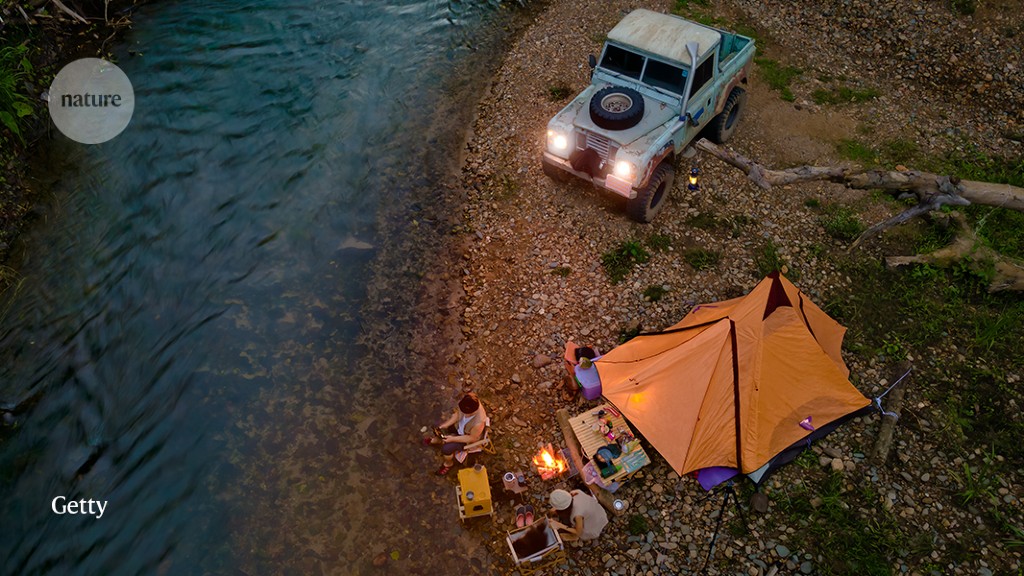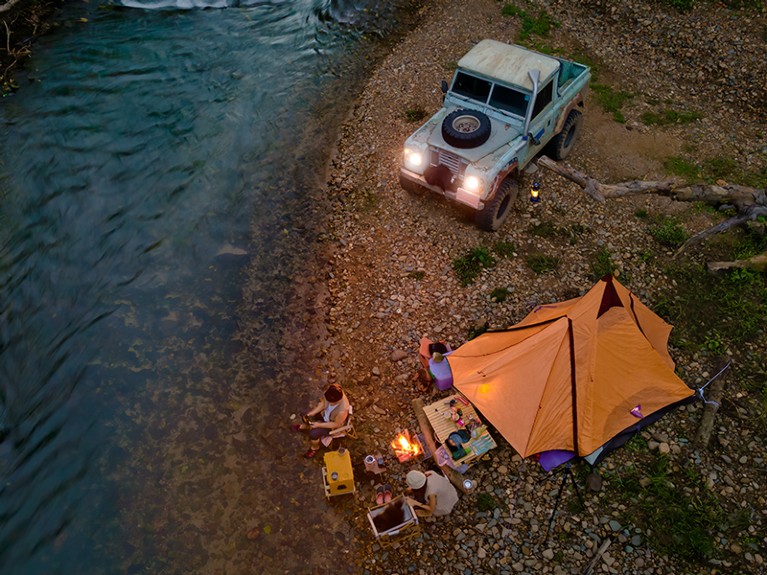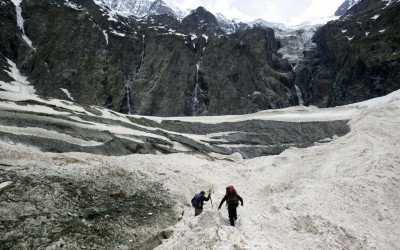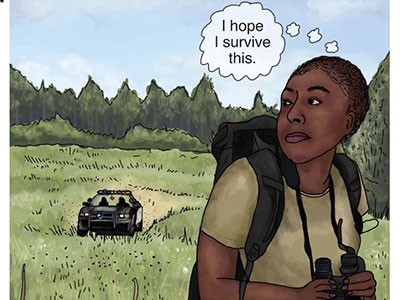Frequent discussion of plans and progress is crucial on camping expeditions, for example, when other forms of communication are unavailable.Credit: Getty
I’ve been involved in field biology for more than a decade. I started in forest ecology, transited through offshore observations of marine mammals and I now mostly record animal sounds on land and at sea. Many people enter fieldwork not knowing how difficult it often is. Some of the challenges I’ve faced over the years include sickness in remote areas, working crazy hours under heavy rain and sharing tiny bedrooms with colleagues you end up seeing 24/7 for months.
Collection: Fieldwork
It’s important for scientists on fieldwork trips to support each other, and most of the people I’ve worked with will try to minimize nasty surprises and make field days comfortable whenever possible. My favourite field season was one spent observing marine mammals in Savona, Italy. We sizzled in the burning sun following whales, but made sure we never ran dry of coffee, and we spoilt ourselves with food. In another great season, I was able to take time off to chill and swim in some of New Zealand’s nicest bays, when the dolphins weren’t around.
But the nature of fieldwork means there are many factors that my team and I simply cannot control: the animals we study might not show up, equipment might fail suddenly, the weather might be terrible. Because of this, we are usually unable to schedule work in advance, and will often not know that we’re going to work until the last moment.
Such uncertainty can be difficult for everyone, of course. We can’t plan days off, and often can’t even do our laundry without wondering whether we’ll be called on duty in the middle of it. Yet there are people who’ll be hit particularly hard by all this: carers, and those doing a second job or navigating long-distance relationships, might all need fair warning on when to expect to travel. For those people in particular, the field season can become unbearably stressful or expensive, especially if travel or babysitters have to be booked or cancelled at the last moment. I was once called on duty when babysitting for a friend on my day off. Thanks to a network of friends, I was able to quickly change a day on the beach for a day on a research vessel — but that kind of flexibility cannot always be expected.
Safe fieldwork strategies for at-risk individuals, their supervisors and institutions
So, what can be done? Understandably, we can’t get rid of these uncertainties, but we can at least keep workers informed about changing plans or likely difficulties. Better communication — and making sure that everyone involved knows everyone else’s thinking — certainly helps. Different members of a team will have different responsibilities, so what might be obvious to one person might not be obvious to others. But it still needs to be communicated. For example, certain procedures require time off the field; conversely, there are periods when all hands are needed. Either way, make sure everyone understands that. And whenever something happens to the equipment, or the weather forecast is looking so dreary that field days are unlikely to happen, tell all the staff involved — and then tell them again.
In the loop
Clear communication is a shared responsibility. Seasonal workers, technicians, students, interns and entry-level staff all need to be kept in the loop and be able to feed back to each other. Often, those who are not decision makers can be accidentally left in the dark. A team might consider designating one or two people to be responsible for this communication, to make sure that nothing is omitted. Be respectful that your colleagues are more than their work.
Braving stings to put jellyfish on the menu
To ensure that all this happens, think carefully about what kind of planning can be done for your specific work. For example, some events might determine what happens next (such as when the collection of a tissue sample needs to be followed immediately by a day in the laboratory). Or there might be periods when work is impossible (because of planned military exercises in the study area, say, or the absence of crucial staff, such as boat captains). Or perhaps a low workload one week means that not all hands are needed, and that half the team can take time off. Don’t expect anyone to just know the plans: instead, communicate them to everyone involved, frequently.
A shared calendar is an excellent way to share your plans (see ‘Checklist’). Before the field season starts, make a list of tasks and — when applicable — an approximate timeline, and keep these updated in your team’s online shared spaces. If you work in a place with no or limited Internet connection, pin or write these updates on a physical board instead. If even that is impossible — for example, while camping — simply discuss progress and plans daily. Whenever a person joins the project, and whenever any changes happen, discuss the plans and arrangements again. This might sound tedious, especially if there are staff changes over the season, but keep in mind that everyone deserves the same introduction — even the experienced staff. Make sure that people feel comfortable taking time off when it’s possible, and are prepared to work when they’re needed.
Even in the messy and dynamic situation that fieldwork is, some things should always be remembered. Acknowledge the lives of others; respect their time; let them know what to expect and when to expect it. In the end, you form one team, and everyone’s well-being should be everyone’s priority. Treat your field workers as equals. Not only will that enable them to have as normal a life as possible during the field season, but they will also feel seen and included, and simply happier. With all its uncertainty and difficulties, fieldwork is still a beautiful job. Be open about it.
The author declares no competing interests.
This is an article from the Nature Careers Community, a place for Nature readers to share their professional experiences and advice. Guest posts are encouraged.








More News
Could bird flu in cows lead to a human outbreak? Slow response worries scientists
US halts funding to controversial virus-hunting group: what researchers think
How high-fat diets feed breast cancer